The Generative Engine Optimization Agency for AI-Driven Visibility
Show up when people ask ChatGPT, Perplexity, and AI Overviews for recommendations in your category… before competitors do.
.svg)


%20(1).png)
.svg)


%20(1).png)
.svg)


%20(1).png)
.svg)


%20(1).png)
.svg)


%20(1).png)
.svg)


%20(1).png)
Achieve Early-Mover Advantage in AI-Powered Search/GEO
Your customers aren't just Googling anymore—they're asking ChatGPT for recommendations, using Perplexity for research, and trusting AI Overviews in search results. If your brand isn't showing up in those AI-generated answers, you're invisible to millions of potential buyers.
We ensure that when someone asks an AI tool "what's the best [your solution]," your brand gets cited and recommended. We've helped clients generate thousands of monthly visits from AI platforms that traditional analytics can't even see.
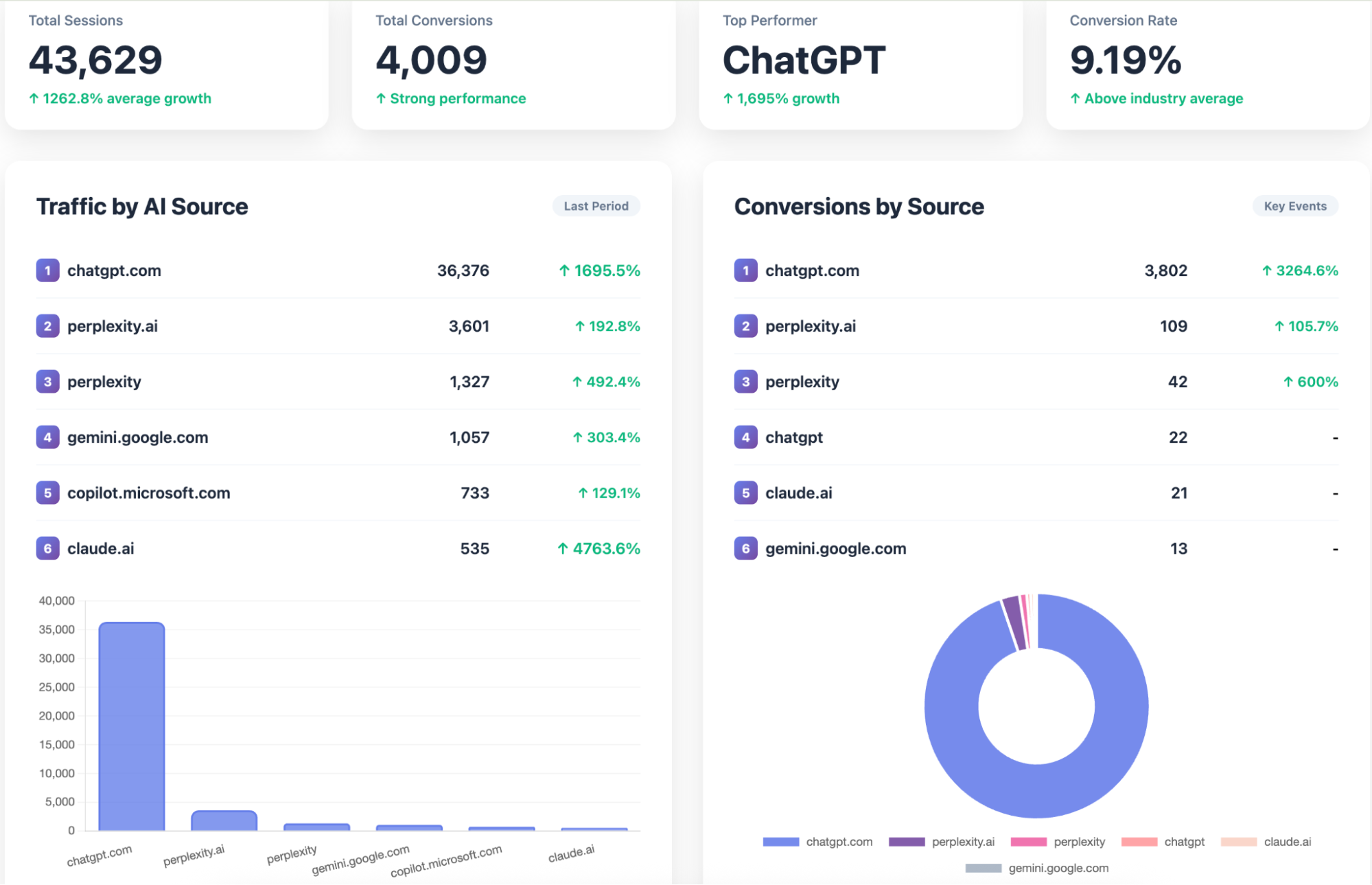
Stop burning cash on paid ads with rising costs and diminishing returns. Organic search delivers qualified leads at a fraction of the cost, with conversion rates that compound over time as your authority grows.
We secure a crucial early-mover advantage in emerging AI search environments. This ensures your expertise is prominently cited where direct competitor noise remains minimal.
Our custom dashboards quantify the unmeasurable, providing transparent tracking of citations, mentions, and revenue influence across all key Generative AI search systems.
Our Foundational Approach to Generative Engine Optimization
Most agencies treat GEO like traditional SEO with a new label—they're not actually optimizing for how AI platforms evaluate and cite content.
We built our methodology by reverse-engineering what makes ChatGPT, Perplexity, Claude, and AI Overviews choose specific sources over others. It's not just about keywords or backlinks—it's about semantic clarity, authoritative signals, structured data that AI can parse, and content that answers questions the way conversational AI expects.
We optimize your existing content for AI comprehension, create new citation-ready assets targeting high-intent queries, and track your visibility across every major AI platform. The result: your brand becomes the answer AI gives when your ideal customers ask for solutions.
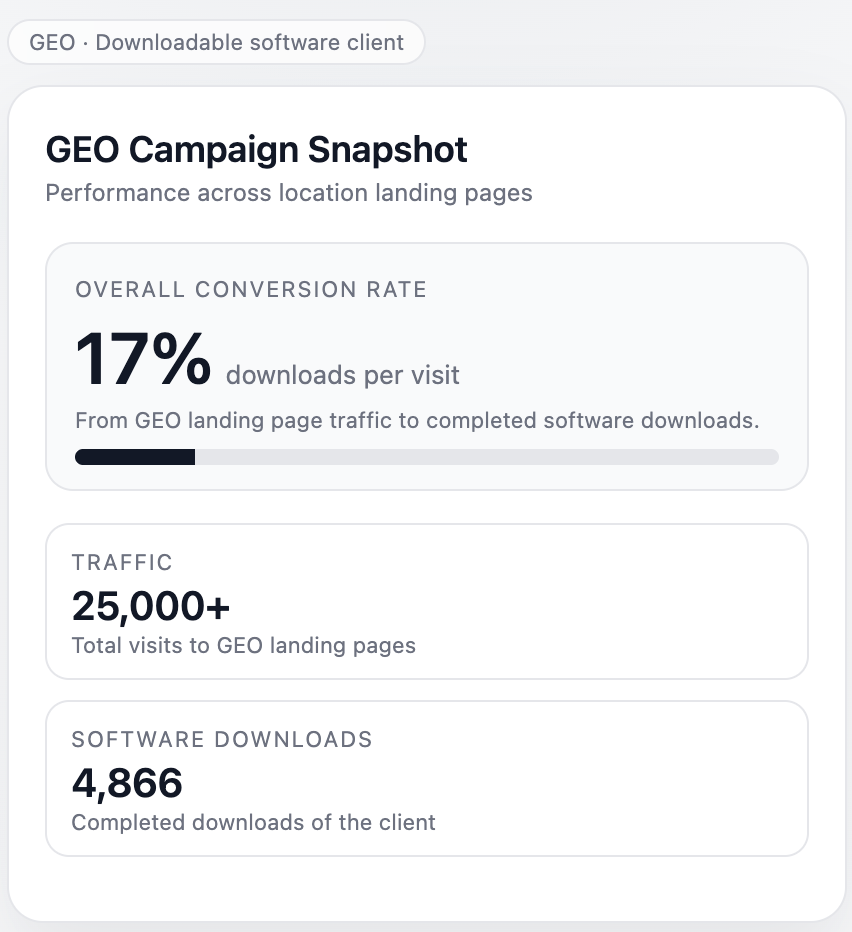
We Offer...
We systematically test hundreds of prompts across ChatGPT, Perplexity, Claude, and AI Overviews to baseline your current visibility and identify exactly where competitors dominate citations in your category.
We restructure existing content with semantic clarity, FAQ schemas, and authoritative signals that generative engines prioritize when selecting sources to cite.
Technical optimization that helps AI platforms understand your brand, products, and expertise…connecting you to knowledge graphs that influence citation decisions.
Real-time dashboards showing where and how often your brand appears in AI-generated responses, with competitor benchmarking you can't get from traditional analytics tools.
Our Generative Engine Optimization (GEO) Process
We start with a detailed discovery call to understand your business goals and target customers. This step ensures all Generative Engine Optimization activities are directly focused on driving your bottom-line revenue results.
We perform a complete analysis of your website assets to find technical issues. We also set up critical revenue-based tracking systems for accurately measuring your Generative Engine performance and attribution.
This phase involves systematically building your technical foundation and specialized content strategies. This setup ensures both scalable programmatic content and consistent brand citation authority across all major LLMs.
We carefully measure the direct financial impact of our work on your revenue and AI visibility. Then, we quickly refine successful strategies and expand their application across new market segments.
Here's What They're Saying Regarding Our Services...
"The content we’ve gotten from other services didn't provide the returns they'd promised. Since working with Embarque, we've increased our YoY revenue by 1600%. The ROI has been pretty significant, to say the least."
"Since implementing Embarque’s strategy, we’ve seen some of our pages gather significant search traffic. In particular, our podcasting name generator gets thousands of search clicks."
"We've been steadily increasing our monthly web views—compared to 2021 Q3 to 2022 Q2, we've seen a 178% increase in our blog traffic."
"Appreciate the small-but-mighty team at Embarque. They offer product-based writing, great for SaaS."
"Embarque’s expertise in SEO has been crucial in the growth of our product. Our website is now ranking on the first page of Google search for relevant queries, and we’ve earned $35,000 in revenue thanks in part to Embarque."
%202%20(6).avif)
"We managed to start ranking in the top 3 results on Google for several of the terms we were targetting within 3 months of getting content from Embarque."
"After 2 months, Embarque had written 6 articles for us and they already get more than 4,000 clicks per month (!!!) from Google - growing steadily."
"Before finding Embarque, I had tried several other content marketing agencies but they were either too expensive or the quality of writing was subpar. However, Embarque offers a great price for the level of service they provide."
"Embarque delivered clear, timely results, improving our site traffic and domain authority. Communication was smooth through virtual meetings and messaging, and they consistently met deadlines. A great experience overall."
Choose Embarque for GEO If…
You're tired of SEO agencies that promise rankings but can't connect traffic to revenue, and you're ready for a partner who understands SaaS metrics and MRR growth.
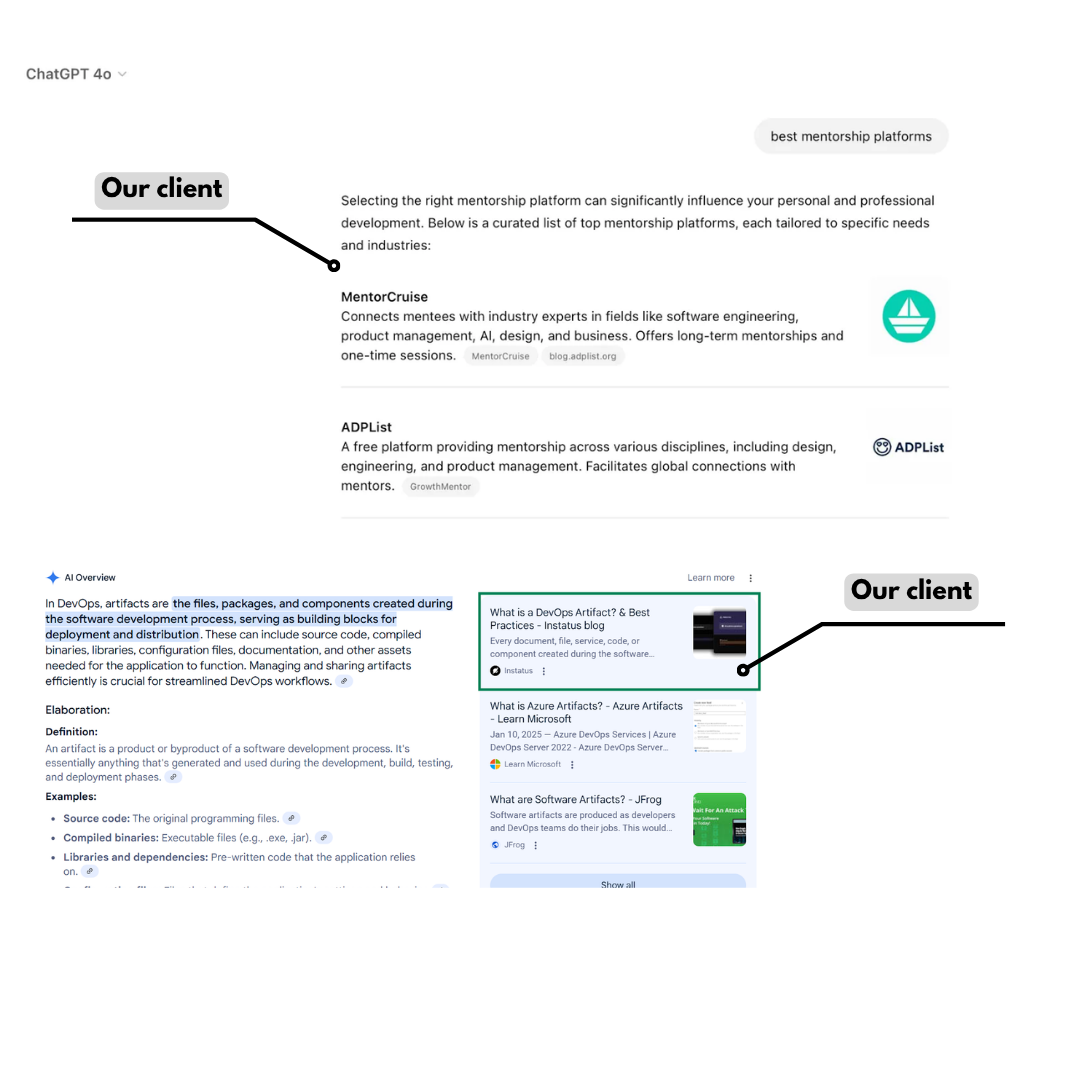
How We Stack Against
Other Options



Book a Strategy Call
Walk away with a clear roadmap to rank higher, convert faster, and grow sustainably.
Get started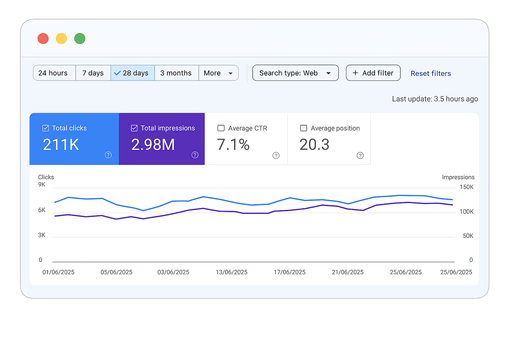
Frequently
Asked Questions
How do I know if I actually need a GEO agency or if we can handle this in-house?
You need a GEO agency if your team doesn't have the bandwidth or specialized expertise to systematically test AI platforms, reverse-engineer citation patterns, and implement technical optimizations across your content.
Here's the reality—most marketing teams are already stretched thin managing traditional SEO, paid ads, content marketing, and a dozen other priorities. GEO requires dedicated focus: weekly prompt testing across multiple AI platforms, understanding semantic optimization and schema markup specific to AI comprehension, tracking citation metrics that standard analytics tools don't measure, and staying current with how rapidly AI algorithms evolve.
If you've got someone in-house who can dedicate 20+ hours weekly to this and they already understand entity optimization, structured data for AI, and conversational content architecture—sure, try it yourself. But most companies don't.
The bigger question: what's the opportunity cost? While your team figures out GEO through trial and error over 6-12 months, your competitors working with agencies are already getting cited and capturing that traffic. We've spent thousands of hours analyzing what makes AI platforms cite specific sources.
That learning curve has real costs. Our clients see traction in 2-3 months because we've already done the research, built the processes, and know what actually works versus what wastes time.
What should I look for when evaluating different GEO agencies?
First, demand proof they actually do GEO, not just rebranded traditional SEO. Ask to see their AI visibility tracking dashboards—if they can't show you real citation data from ChatGPT, Perplexity, Claude, and AI Overviews, they're not really doing GEO.
Second, look for documented case studies with specific metrics: traffic from AI platforms, citation frequency increases, before-and-after visibility comparisons.
Our AI SEO case study shows thousands of monthly visits from Perplexity and ChatGPT with measurable growth trajectories.
Third, ask about their testing methodology. Good GEO agencies systematically test hundreds of prompts to baseline visibility and track improvements.
If they can't explain their prompt testing process in detail, that's a red flag.
Fourth, evaluate their technical expertise around structured data, entity optimization, and semantic markup—these are foundational to GEO, not optional extras.
Fifth, transparency matters. You should get regular reports showing exactly where you're cited, how often, and compared to competitors. Avoid agencies making guarantees about specific placements—that's either dishonest or naive.
Finally, look for integrated thinking. The best GEO agencies don't treat this as completely separate from traditional SEO because the fundamentals overlap. If they're telling you to abandon traditional SEO entirely, they don't understand how authority and credibility signals work across both channels.
How much should I budget for GEO agency services?
Most comprehensive GEO engagements run $2,000-$8,000 monthly, though some specialized agencies charge more for enterprise clients or aggressive timelines.
Here's what you should expect in that range: systematic prompt testing across 100+ queries monthly to track visibility and citations, technical implementation of schema markup, entity optimization, and structured data, content optimization restructuring 8-15 pages monthly for AI comprehension, new citation-ready content creation targeting high-value queries, weekly visibility tracking with dedicated dashboards showing citations across all major AI platforms, and monthly strategy reviews with recommendations based on performance data.
Anything significantly cheaper probably isn't real GEO—they're likely just doing basic content updates and calling it AI optimization. Anything way more expensive should come with clear justification: maybe you're in an extremely competitive industry, need rapid results, or require extensive technical work.
Budget planning tip: plan for minimum 6-month commitments because that's the realistic timeline for meaningful results. The first 2-3 months are foundation-building, months 4-6 is where you see consistent traction.
Cutting off earlier means stopping right when momentum builds.
Also factor in that GEO delivers compounding returns—month six costs the same as month three but delivers significantly better results because citation patterns reinforce themselves over time. Compare this to paid ads where costs stay constant or increase while marginal returns often decrease.
What results can we realistically expect and how long will it take?
Realistic expectations for GEO: you'll start seeing initial citations and early traffic from AI platforms within 4-6 weeks when you optimize high-authority existing content and implement technical quick wins. Meaningful, consistent results typically show up around the 3-4 month mark as citation patterns establish.
By month six, most clients see measurable traffic from multiple AI platforms with clear month-over-month growth. Our AI SEO case study shows thousands of monthly visits from Perplexity and ChatGPT—that level of impact takes quarters, not weeks. Here's what you shouldn't expect: overnight citations from every AI platform, immediate dominance of every relevant query in your category, or guaranteed placement in specific AI responses.
Any agency promising those results is overselling. What you should expect from a good GEO agency: transparent tracking showing exactly where you appear and how often, steady month-over-month improvements in citation frequency, measurable traffic from AI platforms with clear attribution, competitive benchmarking showing how you stack up against others in your space, and strategic recommendations adapting to algorithm changes and emerging patterns.
Results depend on several factors: your starting domain authority and content foundation, how competitive your industry is for AI citations, whether competitors are also optimizing (most aren't yet), and how aggressively you're willing to invest. The brands seeing the fastest results are those treating GEO as a strategic priority, not a side project.
How do you prove ROI and what metrics will we actually track?
Good GEO agencies track metrics that matter, not vanity numbers. Here's what we measure and report:
- Citation Frequency—exactly how many times your brand appears in AI-generated responses across target queries, tracked weekly.
- Platform-Specific Visibility—your appearance rate in ChatGPT, Perplexity, Claude, AI Overviews, and others, with trends over time.
- Share of Voice—your proportion of AI citations compared to competitors in your category, showing market positioning.
- AI-Sourced Traffic—actual visitors coming from AI platforms, measurable in analytics for Perplexity and through tracking methods for others.
- Conversion Performance—how AI-sourced traffic converts compared to other channels (demos, trials, signups, purchases).
- Sentiment Analysis—whether AI platforms represent your brand accurately and favorably in their responses.
You should get dedicated reports with updates showing these metrics, specific prompts that triggered citations, examples of actual AI responses mentioning your brand, and competitive comparisons. For ROI calculation, track customer acquisition cost from AI search versus other channels.
If paid ads cost $500 per customer but AI search delivers customers at $100 each (after accounting for agency fees and time to results), that's clear ROI. Also consider opportunity cost—what happens if you don't optimize and competitors capture all the AI search demand in your category?
Do you work with our existing SEO agency or would we need to replace them?
We can absolutely work alongside your existing SEO agency—in fact, some of our best client outcomes happen through collaboration. We focus specifically on GEO optimization while they continue managing traditional SEO, and we coordinate to ensure nothing conflicts. We'll share keyword research that benefits both strategies, align on content calendars and publishing schedules, coordinate technical implementations so we're not duplicating work, and make sure traditional SEO fundamentals support GEO efforts.
That said, if your current agency claims they're already handling GEO but can't show you citation tracking dashboards, prompt testing results, or traffic from AI platforms, they're probably not actually doing it.
Real GEO requires specific expertise most traditional SEO agencies don't have yet: understanding how AI models parse and select content, knowing which schema types and entity markup matter for citations, systematic testing across multiple AI platforms, and tracking methodology that standard SEO tools don't provide.
Here's an honest assessment: if your current agency is strong on traditional SEO fundamentals and you trust them, adding us for GEO specialization often works great. If your current agency is underperforming or resistant to coordinating with specialists, that creates friction that hurts results.
Some clients eventually consolidate with us once they see we can handle both traditional SEO and GEO effectively. The key question: does having two agencies create collaborative synergy or coordination headaches? We're flexible either way and can adapt to whatever structure serves you best.
What if AI search algorithms change and our visibility drops?
Algorithm changes are exactly why you hire an agency instead of handling GEO in-house and hoping for the best. AI platforms update constantly—Google refines AI Overviews, ChatGPT changes how it weights sources, Perplexity adjusts citation criteria.
A good GEO agency monitors these changes proactively and adapts your strategy before visibility drops significantly. Here's our approach:
- We track your citations across all major platforms continuously, so if visibility drops anywhere, we identify it within days, not months.
- We conduct monthly prompt retesting to detect algorithmic shifts and pattern changes before they become major problems.
- We maintain diversified optimization across multiple AI platforms—if one platform changes algorithms dramatically, you're still visible elsewhere.
- We do quarterly strategy reviews specifically addressing emerging platform updates and adjusting tactics accordingly.
Think of it like this: traditional SEO has seen hundreds of algorithm updates over 20 years. Brands working with good agencies maintained visibility through every change by adapting quickly. GEO is no different—it requires ongoing monitoring and rapid response. The alternative is optimizing once, crossing your fingers, and watching your visibility disappear when platforms inevitably evolve.
Our continuous iteration model means you're never caught off guard. We're tracking, testing, and adjusting constantly so your citations stay consistent even as algorithms shift. This is the value of an agency—we're watching the entire AI search landscape so you don't have to, and we've got the experience to know what changes actually matter versus which are temporary noise.
Can you work with us if we're in a highly regulated or technical industry?
Yes, but it requires the right fit on both sides. We've worked with technical B2B SaaS, fintech, healthcare-adjacent companies, and other complex industries where accuracy and compliance matter. The key is whether your industry has buyers who use AI search to research solutions—if people are asking ChatGPT or Perplexity about problems your product solves, GEO makes sense for you.
For regulated industries, we take extra precautions: our writers research thoroughly and prioritize accuracy over speed, we involve your subject matter experts to review technical content before publication, we're careful about claims and positioning to ensure compliance with industry regulations, and we focus on educational content that establishes authority without making problematic claims.
For highly technical industries, we invest time understanding your product, market, and buyer personas deeply. Our writers aren't churning out generic AI content—we create material that resonates with sophisticated, technical audiences. The MentorCruise case study shows we can handle nuanced positioning in competitive markets. That said, if your industry is so regulated that content requires extensive legal review adding weeks to every piece, or so technical that we'd need months just learning basic concepts, that creates friction that might make GEO timing challenging. The ideal client has complexity that requires expertise but not so much regulatory burden that optimization becomes impractical.
During discovery calls, we assess fit honestly—sometimes we'll tell you to wait six months while you build more content foundation, or that your industry might not be ready for GEO yet because search volume through AI platforms is still developing. We'd rather have that honest conversation upfront than take your money for something that won't deliver ROI.
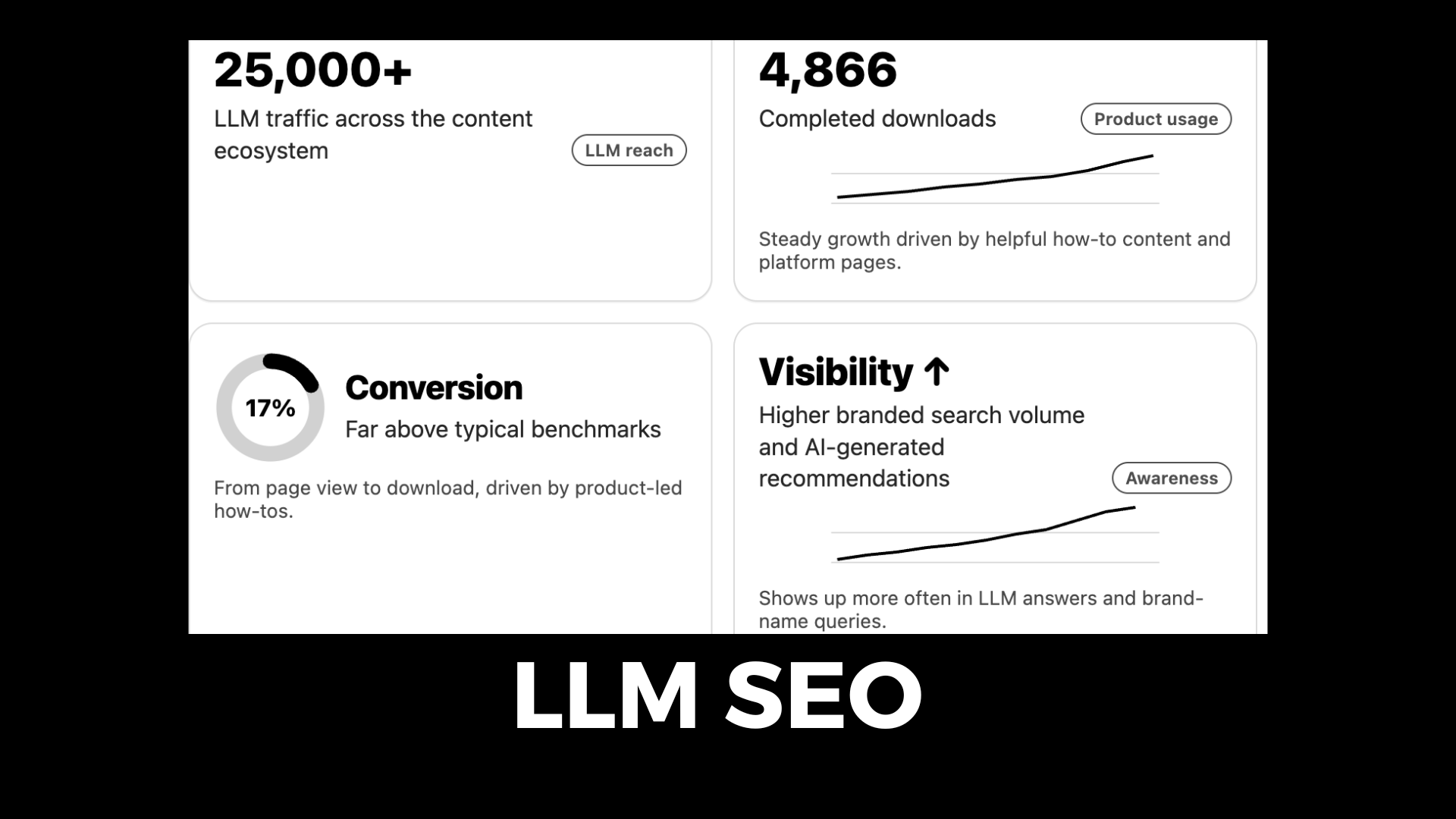
.png)
